-
Vijay Fafat
- Published on
The narrator compares situations in dating life with the choices presented in classic puzzle games like the Monty Hall Problem. She is currently in a relationship with a man with 3 dogs who loves cereal, and she dislikes both. She is hanging in there, doing a “let’s make a deal”, but can that sustain? She discusses the game shows related to this phenomenon, where you can either go for higher prizes for greater risks, or get some certainty-equivalent by making deals. She observes,
“Relationships are like bargains. Everybody weighing what they are willing to give up”. […] Each time I feel that stiffness in my legs, I remind myself of Monty Hall’s game show and all the contestants clamoring to play. If I bow out now someone else will choose him and I might be left with a zonk or nothing at all. Even as I think this I imagine all the better prizes that might be waiting behind other doors without any dogs at all.”
The above is, of course, NOT the Monty Hall setting - it is simply a choice between 3 alternatives. The classic Monty Hall has a third party choosing to open a door after you have made a choice and then requires you to reevaluate your choice, having seen the alternative, and decide whether to stay or switch.
In any case, the narrator goes on to observe in plaintive philosophical mode:
“There’s a famous question about the show that goes like this: There are 3 doors. One holds a brand new car, the other two hold goats. You can’t see what’s behind any of them. You choose Door #1. Monty Hall opens Door #2 and sure enough, it’s a goat. At this point you can either switch your choice or stay with Door #1. What do you do? I guess a bunch of PhD’s met up to work this out. Most of them agree that, statistically speaking, it’s in your favor to switch doors. But they disagree about why. In reality it doesn’t matter because in Real Life, hardly anyone ever chooses to switch. I understand this false logic. Most people make a choice and they stick with it. Even if it might be wrong. Even if there’s a big chance it won’t work out. They like to see their decisions to the end. If you ask me, the real question about the game should be this—why are people so anxious to keep playing?”
And there, then, is the conundrum. You make a choice in life. Having made that choice, life gives you a glimpse of what’s behind that same door (dogs, cereals, common human foibles) and makes you wonder if you want to switch. This, again, is not the Monty Hall problem, but then again, does that matter? You still have a choice to make…
